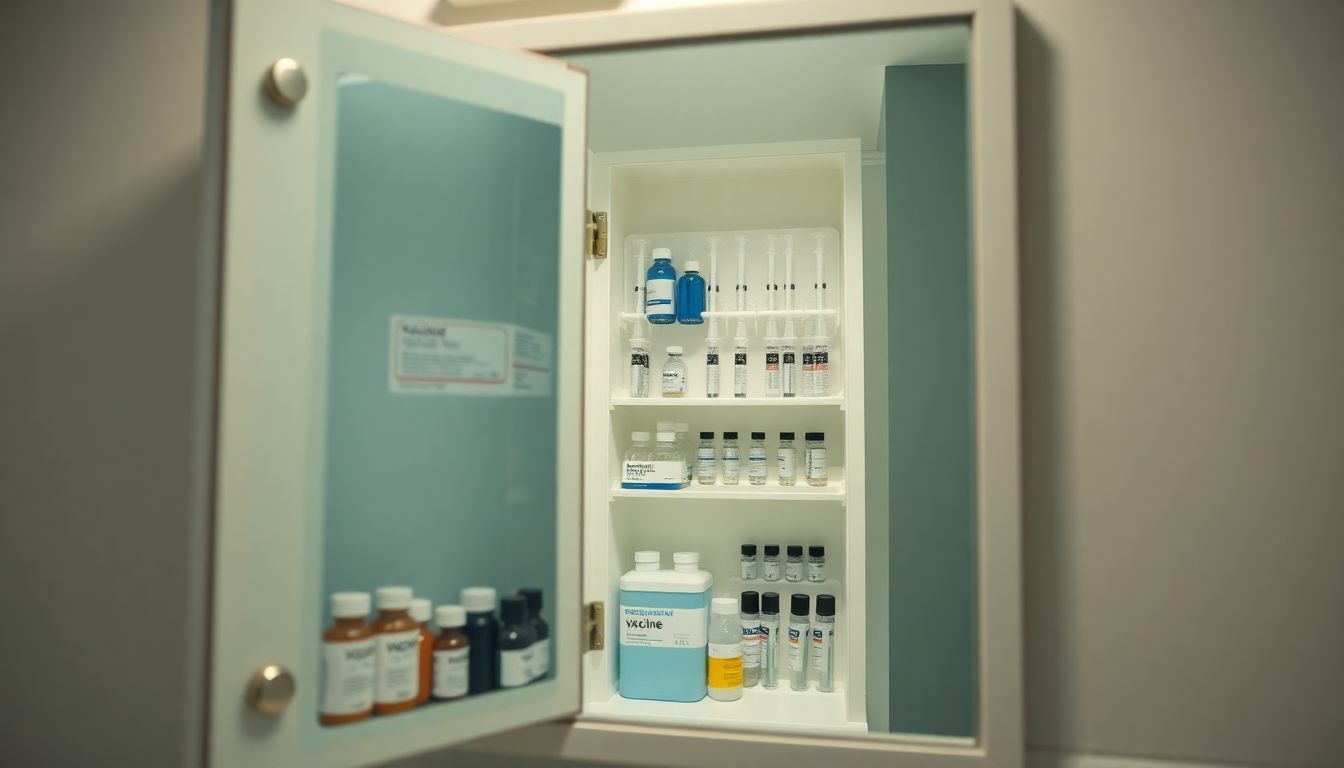Many adults think vaccines are only for kids. This isn’t true—vaccines protect people of all ages from serious diseases like the flu, shingles, and measles. In this blog, you’ll learn why staying updated on vaccinations is key to your health and community safety.
Thank you for reading this post, don't forget to subscribe!Keep reading—it’s important!
Key Takeaways
- Vaccines protect all ages from diseases like the flu, measles, and shingles. Adults should stay updated to safeguard health and prevent outbreaks.
- Global vaccination efforts reduced measles cases by 79% between 2000-2014 and eradicated smallpox in 1980 through WHO campaigns.
- Pregnant women need vaccines like Tdap to protect themselves and their babies against pertussis (whooping cough) and group B strep.
- CDC advises adults over 50 to take the shingles vaccine, while high-risk groups need flu shots and pneumococcal vaccines yearly for protection.
- Trusted resources like CDC and WHO provide detailed schedules, safety info, and tools to track vaccinations for better health planning.
Importance of Immunizations Beyond Childhood
Vaccines protect adults from getting sick and spreading infections. They also play a big role in keeping communities safe and healthy.
Preventing serious diseases and outbreaks
Immunizations keep communities safe by stopping the spread of infectious diseases. Diseases like measles, pertussis, and hepatitis B can cause severe illness or death if left unchecked.
Annual flu shots protect people over six months old from seasonal viruses that mutate quickly. In pandemics like COVID-19, vaccines helped reduce hospitalizations and deaths worldwide.
Outbreaks decline when more people get vaccinated. Herd immunity builds a shield for those who cannot receive vaccines—like infants or certain health conditions. Measles cases dropped by 79% between 2000 and 2014 due to global vaccination efforts.
Vaccines don’t just protect individuals; they secure public health on a larger scale.
Preventable diseases should not claim lives in this modern age.
Contribution to public health safety
Vaccines keep communities safe by stopping the spread of diseases. They lower the disease burden, protect at-risk groups, and improve health equity. Herd immunity acts as a shield for people with weak immune systems or certain conditions who can’t take vaccines.
For example, measles vaccination helps prevent outbreaks in schools or crowded areas.
Immunization programs like the Expanded Programme on Immunization save millions of lives globally. According to WHO, routine immunizations reduced child mortality significantly by tackling vaccine-preventable diseases like measles and pertussis.
Vaccinations also support global health goals like Immunization Agenda 2030 (IA2030).
Recommendations for adult vaccinations
Adults need protection too. The CDC urges vaccines like the influenza shot yearly to shield against seasonal flu, especially for older adults and high-risk groups. Everyone aged 50+ should consider the shingles vaccine to prevent painful rashes caused by herpes zoster.
Staying updated on pertussis (whooping cough) with a Tdap booster is vital, particularly if near babies or pregnant women. Pneumococcal conjugate vaccines help protect older individuals and those with certain health conditions from pneumonia.
These steps save lives and reduce disease risks globally.
Age-Specific Immunization Recommendations
Vaccinations are important for all ages to prevent diseases and stay healthy. Different life stages, like pregnancy or older age, may need specific vaccines to offer extra protection.
Unique recommendations for specific age groups and risk categories
People over 50 should get the shingles vaccine to avoid painful outbreaks. This is important, as shingles risk rises with age. Pregnant women need vaccines like the Tdap to protect both themselves and their babies from pertussis (whooping cough).
HPV vaccines are strongly advised for teens and young adults to prevent cervical cancer.
High-risk groups include those with chronic illnesses or weakened immune systems. They should get annual flu shots and pneumococcal conjugate vaccines (PCV) to protect against severe respiratory infections.
The CDC provides detailed immunization schedules suited to these specific needs.
Importance of vaccinations during pregnancy
Vaccinations during pregnancy shield both mother and baby. They lower the risk of severe illnesses, like influenza and whooping cough (pertussis). These vaccines provide antibodies to the baby, protecting them in early life when their immune system is weak.
Pregnant women are urged to consult healthcare providers for specific vaccines. The Tdap vaccine helps prevent group B streptococcus and pertussis in newborns. Flu shots reduce complications from respiratory infections.
Vaccination prevents disease transmission, ensuring healthier outcomes for families and communities.

Success Stories and Statistics
Vaccines have stopped diseases like measles and polio from spreading in many places. Data shows huge drops in deadly illnesses thanks to immunization programs worldwide.
Examples of vaccine-related success stories
Smallpox was eradicated in 1980 after a global vaccination campaign. It once killed millions but is now gone thanks to immunization programs. The World Health Organization (WHO) led efforts to deliver vaccines worldwide.
Measles cases dropped by over 75% between 2000 and 2017 due to widespread vaccine coverage. Outbreaks have reduced significantly, saving lives and protecting children globally. These successes highlight the power of disease prevention through routine vaccinations…
Moving on, age-specific recommendations ensure targeted protection for all groups!
Statistics showing the reduction of vaccine-preventable diseases
Vaccines have drastically lowered cases of diseases worldwide. The CDC reports that measles cases in the U.S. dropped by over 99% since the vaccine became widely used. Polio, once a global threat, has seen near-total elimination in many countries thanks to immunization programs.
Flu vaccinations prevent millions of illnesses annually. Between 2010 and 2020, flu shots reduced hospital visits by up to an estimated 40%. Shingles vaccines also show success—older adults who get vaccinated see about a 90% lower chance of severe illness.
These numbers highlight how vaccines save lives and protect communities every day.
Consultation and Resources
Talk to your doctor about vaccines you may need as an adult. Use trusted health websites for detailed immunization schedules and advice.
Importance of consulting healthcare providers for personalized vaccination schedules
Healthcare providers can guide you on which vaccinations suit your health and age. They look at factors like medical history, allergies, or chronic conditions. This helps create a schedule that fits your needs.
For example, people with diabetes might need extra protection against pneumonia through the pneumococcal conjugate vaccine.
Regular check-ins ensure you’re updated on booster doses for vaccines like tetanus or covid-19. Providers also explain side effects clearly so you feel confident about getting vaccinated.
These consultations support both personal health and public safety by reducing risks of serious diseases like measles or hepatitis B.
Educational resources and websites for more information on immunization schedules and recommendations
The CDC website offers up-to-date vaccination schedules for all age groups, including adults. It provides easy-to-use tools to track vaccination status and maintain records. You can find detailed guidelines on vaccines like the hepatitis B vaccine or the pneumococcal conjugate vaccine (PCV).
The WHO shares global immunization recommendations through its resources. These include information about disease control efforts, such as those targeting measles outbreaks or yellow fever.
Educational materials also explain vaccine safety and efficacy to help reduce vaccine hesitancy. Use these trusted sources for clear and reliable advice.
Conclusion
Stay proactive about your health with timely vaccinations. Talk to a healthcare provider today and take a step toward better well-being.
Encouragement to prioritize vaccination status and seek guidance from healthcare professionals.
Check your vaccination records regularly. Vaccines like the pneumococcal conjugate vaccine (PCV) and pertussis vaccination help prevent serious diseases. Missing doses can leave you unprotected against illnesses like Haemophilus influenzae type b or tetanus.
Speak with healthcare professionals about your needs. They provide specific advice for risks based on age, health, and lifestyle. Guidance is vital during events like the COVID-19 pandemic to ensure access to important immunizations.
Vaccination programs boost child survival rates while reducing preventable deaths worldwide.
